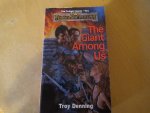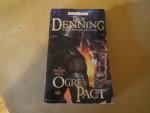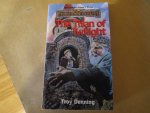#035 The Giant Among Us by Troy Denning (Twilight Giants 2)
Read 10/12/19 to 13/12/19

Book 2- and more of the same, the middle book of the trilogy and so while plenty happens there's not much in the way of change, at the end of the novel we're pretty much in the same place for the start of the third novel. The bad Giants (the Frost Giants including Shaman, and 'the Ettin') et al get thwarted, and the good guys (and Giant-kin) are still in the game.
Tavis the Firbolg First Scout is some mad cross between Chuck Norris and the guy from the TV Series Kung Fu (David Carradine played him, that right?). Reading the trilogy through you could play a satisfying (although possibly slow-paced, dependent on your reading speed) drinking game downing a shot every time Tavis get beaten to a pulp, and then gets up again. That's some powerful healing Brianna (and others) have going on.
There are issues, of course, the biggest of which is Prince Arlien of Gilthwit, to begin with about 10 pages after first reading the word 'Gilthwit' some part of brain came up with the fact that Gilthwit wasn't as I first suspected a small village on the Yorkshire/Lancashire (in the UK) county border, but was in fact an anagram of Twilight.
The last novel had Brianna being captured and transported to the Twilight Vale, the series is called the Twilight Giants trilogy, the last book of which is called 'The Titan of Twilight'. So, Prince Arlien is something to do with the Twilight (Giants) but that may not be an easy/obvious connection to make. The real problem is Arlien is downright suspicious from the get go- the reader learns to instantly dislike/distrust him, so unless he's a red herring (he's not- that's Cuthbert) then the cat's out of the bag (continuing the metaphor).
The real stars of the novel however are Avner (and a tiny bit of Basil) and Graytusk, the Mammoth. Avner has grown up a little- he's now a 12th Level Rogue 3rd Level Assassin with a fatal sneak attack- with sling, dagger, spoon, whatever... The lad still gets in to trouble and needs rescuing every now and then but then again so does our hero Tavis, and Avner (and sometimes Basil, the Runecaster Verbeeg) are always on hand to leap in to the fray.
Does Avner get his own trilogy?
Imagine the Avner & Graytusk, like Fafrhd & the Grey Mouser only with a trunk.
So, I liked it- because there's lots of action and some nice insights in to this and that, but it didn't grab me- it wasn't remarkable, the villains were less than compelling and in the end (mostly) easy enough to deal with.
Also, Brianna- she says she loves our soon to be Lord Scout (Tavis) and yet she still doesn't get that her man doesn't lie (and values... well, values). I get that Gilthwit/Twilight puts the charm in, but even before then she's saying one thing (to Tavis) while at the same time doing/saying/thinking other things which are clearly contrary to her self-professed feelings of love for the runt Firbolg. Or else are going to potentially break the poor saps heart- why can't she figure this, they've been a couple (seemingly) for a good long while now.
The problem in some of these books that have romantic entwined male/female leads, or pairings, is that generally neither of the duo actually knows (or understands) anything much about their partner- beyond a bit of history (maybe) the rest is mostly surface.
Actually, scratch that- Cadderly & Danica in the Cleric series (Salvatore again) are probably the exceptions to this rule, the rest are ciphers, or else place-holders for romantic couples. That said Tavis (of course, he's a bloke) is better at being a considerate (thinking) partner than Brianna by a mile (she's a woman- and subject to her emotional state- phew, that's tired).
Bring back Azure & Dragonbait, whatever they have there's love in it.
Read!



